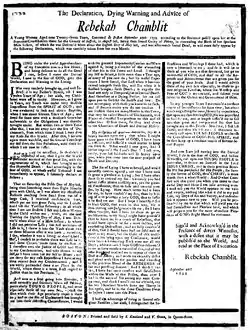

Rebekah Chamblit (c.1706–1733) lived in Boston, Province of Massachusetts Bay, in the 18th century. She was tried and executed in 1733 for infanticide.
When she was 26 years old, an unmarried Chamblit became pregnant. In May, 1733, she gave birth to what was probably a stillborn. By her own account: "On Saturday the fifth day of May last, being then something more than eight months gone with child, as I was about my household business reaching some sand from out of a large cask, I received considerable hurt, which put me into great pain, and so I continued till the Tuesday following; in all which time I am not sensible I felt any life or motion in the child within me; when, on the ... Tuesday of the eighth day of may, I was delivered when alone of a male infant; in whom I did not perceive life...."[1]
At length the situation was brought before a jury, "who brought in their verdict, Guilty. Accordingly ... the poor woman received Sentence of Death."[2] Her "declaration," "read at the place of execution," September 26, 1733, may not have been in fact written by Chamblit herself; scholars suggest the text represents a forced confession.[3]
References
- ↑ The declaration, dying warning and advice of Rebekah Chamblit. A young woman aged near twenty-seven years, executed at Boston September 27th. 1733. According to the sentence pass'd upon her at the Superiour Court holden there for the county of Suffolk, in August last, being then found guilty of felony, in concealing the birth of her spurious male infant, of which she was delivered when alone the eighth day of May last, and was afterwards found dead, as will more fully appear by the following declaration, which was carefully taken from her own mouth. Boston: Printed and sold by S. Kneeland and T. Green, in Queen-Street, 1733.
- ↑ New England Weekly Journal, Aug. 27, 1733.
- ↑ Sharon M. Harris. Feminist Theories and Early American Studies. Early American Literature, Vol. 34, No. 1 (1999).
Further reading
- Records of the Superior Court of Judicature. Massachusetts State Archives, Boston. 1733; Reel 134, vol. 251, #35693. (Cited in Harris, 1999; p. 92).
- Thomas Foxcroft, Lessons of caution to young sinners. A sermon preach'd on Lord's-Day Sept. 23. 1733. Upon the affecting occasion of an unhappy young woman present in the assembly under sentence of death, 1733.
- Sharon M. Harris, "Feminist Theories and Early American Studies," Early American Literature, Vol. 34, No. 1 (1999), pp. 86–93.